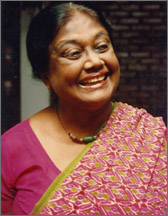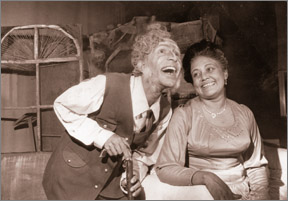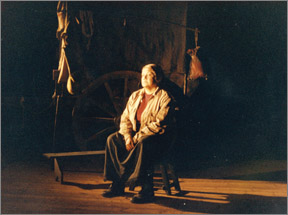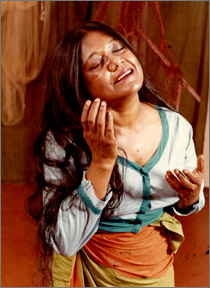An honest application to culture
Matured artist advices the nation on
Art :
***
|

Multi-faceted personality Somalatha Subasinghe |
 She is one of the best stage actresses ever produced who took part
both in stylised and realistic plays. I still remember her character old
woman in Prof. Sarachchandra's semi-stylised play "Raththaran", as a
member of the original cast, as her best portrayal. She is one of the best stage actresses ever produced who took part
both in stylised and realistic plays. I still remember her character old
woman in Prof. Sarachchandra's semi-stylised play "Raththaran", as a
member of the original cast, as her best portrayal.
Her acting was highly impressive even as an undergraduate, in her
long history an actress especially in Sarachchandra's and Gunasena
Gallapaththi's days remarked Prof. Ariya Rajakaruna. One of the most
exciting actresses I have encountered in my life, Dr. Lakshmi de Silva,
former Head of the Department of English, University of Kelaniya.
****
An artist should be committed to social justice and to his/her own
conscience, otherwise he/she is a mere entertainer states veteran
actress and theatre personality Somalatha Subasinghe citing an example
of a farmer who considers his soldier son as an object to acquire basic
human needs.
The protracted war has completely changed the basic norms of
humanity, even eroding the parental love towards children.
| |
|

Highly impressive Cherry Uyana
|
|

The serious actress in Diriya Mawa (Sinhalese adaptation of
Mother courage and her children) |
|

New production of Mudu Puththu: Acting incomparable |
She questions how long an artist with a conscience can be deaf and
blind to the situation. Artist should commit to conscience and social
justice.
Her forte in art and theatre is children's play which is an almost
neglected but an important area in contemporary Sri Lankan theatre. Her
dramas for children are always tied up with a moral lesson beyond the
storyline that teaches children to think rationally, recognizing social
justice in order to make children good human beings with leadership and
rational thinking.
Through the Lanka Children's and Youth Theatre Organization (LCTYO),
a voluntary organization she founded in 1981, Mrs. Somalatha Subasinghe
attempts to reach the children of grass root level with a view to
enhance their creativity.
She believes that every child should be happy and next to the food
and shelter, the play can teach children many lessons; theatre has a
healing and therapeutic effect on Tsunami affected children, especially
those who lost their parents.
Referring to the application of art and culture in Sri Lanka, she is
of the view that it should be honest without any prejudices. The pieces
of art which intend to promote and foster certain cultural vales should
go on with a label for a certain age group and that those who wish to
watch should be allowed to do so.
However, the authorities can not decide whether a piece of art or
film should be viewed or not. Who has decided Sulaga Enupinisa (The
Forsaken Land) a bad film The film is not suitable for children as they
could not grasp the symbolic statement in the film.
The film shows what would happen to human beings when war has taken
away what they had. There is a possibility of human beings assuming the
characteristics of animal behaviour in such an arid environment.
It is ironic while the newspapers carry in full stories where father
rapes daughter, the serious works of art is prohibited to exhibit in the
name of culture and allegedly degrading the moral of the armed forces.
As far as Sulaga Enupinisa (The Forsaken Land) is concerned, she
believes that nothing degrading or humiliating of the armed forces whose
prime duty is to protect the nation, has been done in portraying a scene
where a home-guard is thrown into a river for sheer fun by the
patrolling group of soldiers.
The situation has turned the human being into animal nature and the
animal instincts work. She attributes the uproar over Sulaga Enupinisa
to a mean understanding of symbolism. This is the result of people not
being exposed to classical art and also not learning to appreciate fine
works of art.
Commenting on Aksharaya , she opined the incident in the nature of
what happened in Aksharaya could happen and there is no precedent that
common occurrence should always be incorporated into a work of art. Duty
of the artist is to warn the society of possible scenarios that could
have happened.
Among the characters she played on the silver screen, Somalatha
Subasinghe likes the role she played in Viragaya which she described as
one that she immersed herself in.
The most inspiring iconic figure, for Somalatha Subasinghe, in Sri
Lankan theatre was Professor Ediriweera Sarachchandra. He brought up a
whole nation together and his commitment to theatre was awe-inspiring.
In the early days of his career at Peradeniya, Professor Sarachchandra
was always out on an assignment even skipping meals.
He led a very frugal life. Most of his time, he spent in researching
and creating works of art. Prof. Sarachchandra encouraged her and left a
lasting influence on her career in theatre.
As she was fortunate to cross paths with almost all the veterans in
the field of theatre including Gunasena Gallapaththi and Dhamma Jagoda,
She played lead roles in their classical productions such as Sarah in
Gunasena Gallapaththi's Muhuduputtu and Jessica , Liya Thambara by
Ranjith Dharmakeerthi, Henry Jayasena's Diriya Mawa Sinhalese
translation of Mother Courage, Ranavishkaya in Cherry Orchard and Kumari
in Dhamma Jagoda's Vesmunu. Those roles were like Universities and the
directors were bi-lingual and experimented with the theatre.
According to Somalatha Subasinghe, she is influenced by Prof.
Sarachchandra, veteran dramatist Gunasena Gallapaththi and German
Playwright Bertolt Brecht and Buddhist Philosophy. Brecht said when you
talk about your mother, look at her as your father's wife. Buddha said
that take the veil off your eyes when you look at a problem.
The objectiveness in Brecht's theatre is being applied by Somalatha
Subasinghe in her productions. Being objective while engrossed in a
character is one of the daunting tasks that an actor is entrusted with.
On one occasion, she advised her daughter Kaushalya Fernando not to get
emotionally involved in the character. Brecht's theatre application of
alienation is now applied worldwide.
This is perceived even in Hollywood. Speaking on her children, she
said though her second daughter Shyamalika played the lead role in
Vikurthi , she had to disassociate with theatre after marriage and bore
children.
Shamalika is a sharp critic and her point of view is always taken
into consideration. Her brother analyses the roles she played from a
realistic perspective and a Marxist point of view. It is Marx who has
said that your creativity will be used as an instrument by the powers
be. With the emergence of computer, manual creativity is no longer
needed. She is of the view that creation of art was originally made
manually.
That is the genuine. Commenting on the artists in Sri Lanka, she said
only a few of artists analyze the social and political situation,though
thay have no performing space, in the country through their creations
while a section of the artists are either brainwashed by the system or
subservient to the establishment. This section of artists prevents
serious artists from analyzing the society through their works of art.
One friend expressed dismay at allowing Kaushalya to play a role in
Sulanga Enupinisa and questioned her whether she repent the decision.
Somalatha's reply was that nudity can also be used in art to portray
something demanded by the character and convey some message. Such
portrayals become uncivilized if the nudity is exposed for her
gratification.
Sri Lanka has become a hypocritical nation which denied the existence
of sincere human nature. It is ironical that adults force the children
to hold placards against child abuse.
Although Kaushalya, Shyamalika and her husband Priyanka extend their
helping hand to Somalatha, it is her son-in-law, Senior Lecturer in
Economics, at the University of Colombo; Dr. Chandana Aluthge has been a
live-wear behind major house-hold operations and stands tall as a pillar
of strength behind Somalatha.
As she grew up in a family of teachers; father, a principal and
mother, a teacher, naturally, Somalatha followed the parents footsteps
in becoming a teacher herself. It was an atmosphere dominated by
indigenous forms of art ranging from traditional dance to music which
flourished under the state patronage of the British. The British of the
day had also encouraged agriculture.
Her father sent her to Museus College while her brother D.W.
Subasinghe was sent to Ananda College to learn English. He grew up to be
a committed communist.
Socialist political ideology has greatly influenced her work and
radical application in art. Though she could not campaign alone, she
firmly believes that the artists should rise against any form of
oppression and especially to protect the young talented artists who
create great work of art and the freedom to express them.
[email protected]
*******
Profile of an outstanding artist
1982 Vikurthi (Distortion) an original play focusing on the problems
of the education system of Sri Lanka.
1985 Para Haraha (Across the Road) an original play based on the
conflict between traffic and pedestrians.
1986 Sanda Kinduru (Buddhist theme) written by Gunasena Galappatthi,
staged in collaboration with Sujatha Vidyalaya, subsequently for
television - drama.
1990 Mudu Putthu (Yerma by Garcia Lorca) adaptation by Gunasena
Galappatty
1990 Pawara Nuwarak (city of Fame) Adaptation of a Sinhala classical
poem as a contemporary social comment
1991 Opera Wanyosi of Wole Soyinka (Adaptation as a trilingual
Play-English/Sinhala/Tamil in collaboration with Dept. ofEnglish,
University of Colombo.
1992 The Trial of Dedan Kimathi by Nugugi Wa Thionogo and Micere
Gitahe Mugo Production in English in collaboration with the British
Council, Colombo.
1992 Yadam (Chains) Sinhala Translation of The Trial of Dedan Kimathi
by Nugugi Wa Thionogo.
1993 Antigone by Sophoclese Sinhala Production Translated from
English translation by E. F. Watling
1998 Mavakage Sangramaya Sinhala Translation of Mother Courage and
Her Children by Bertolt Brecht, in collaboration with German Cultural
Institute to commemorate 100th birth anniversary of Bertolt Brecht.
Children' Theatre
1979 Punchi Apata Then Therei (We Know It Now)
1979 Thoppi Welenda (Hat Seller)
1981 Gamarala Divya Loketa (Gamarala Going to Heaven)
1981 Rathmalee (adaptation of Red Riding Hood)
1988 Ottooi (Challenge)
1995 Hima Kumariya (adaptation of Snow White and the Seven Dwarfs)
2003 Walas Pawula (adaptation of Goldilocks and Three Bears)
****
Lanka Children's and Youth Theatre Foundation (LCYTF)
Lanka Children's and Youth Theatre Organization (LCYTO) is a
voluntary organization founded in 1981 by Mrs. Somalatha Subasinghe, the
veteran playwright and theatre director, under the laws of Sri Lanka
with a view to further the cause of children's theatre in Sri Lanka.
It was also meant to fill the vacuum of the necessity of a drama
institution in the country. LCYTO recruits young men and women with high
school qualifications solely on the strength of their commitment to
theatre. Some of them are basic degree holders too.
They are sent through a systematic course of training in drama and
theatre arts along with training in the traditional drama and dance
forms of Sri Lanka. The normal theatre style in Sri Lanka being that of
total theatre, the average Sri Lankan actor/actress has to acquire
training in Sri Lankan dance drama too.
LCYTO has become the only one of its kind in Sri Lanka, which
produces mainly musical plays for children and youth, with professional
actors, and it has also emerged as one of the leading sources of
training centres for performing artistes particularly in children's
theatre.
The high standards set and maintained by LCYTO in their productions
has opened avenues for the professional theatre group to perform and
participate in many international children's and youth theatre Festivals
and conferences in many different parts of the world.
The professional theatre group of LCYTO also performs mainstream
theatre with the objective of improving their skills. It has produced a
number of award winning and highly acclaimed mainstream theatre
productions.
LCYTO was conferred the Bunka Award presented by the Embassy of Japan
for the Best achievement in Performing Arts in 1997. Actors/actresses
and other creative artistes who were trained at LCYTO, work on their own
and for other directors and that LCYTO members have won many awards for
their performances at the State Festivals in stage drama, television as
well as cinema.
The year 2001 State Drama Festival was one such special occasion
where six of LCYTO actors and actresses and other creative personnel
carried away awards for direction, acting, script writing, costume
designing, staged,cor and music as well.
In 2004 Kaushalya Fernando, one of the directors of Play House-Kotte,
bagged the prestigious Bunka Award for special achievement in Theatre
and Acting.
LCYTO became an incorporated foundation called Lankan Children's and
Youth Theatre Foundation (LCYTF) by an Act of Parliament (Act no. 3 of
2007) on 29th January 2007. |
